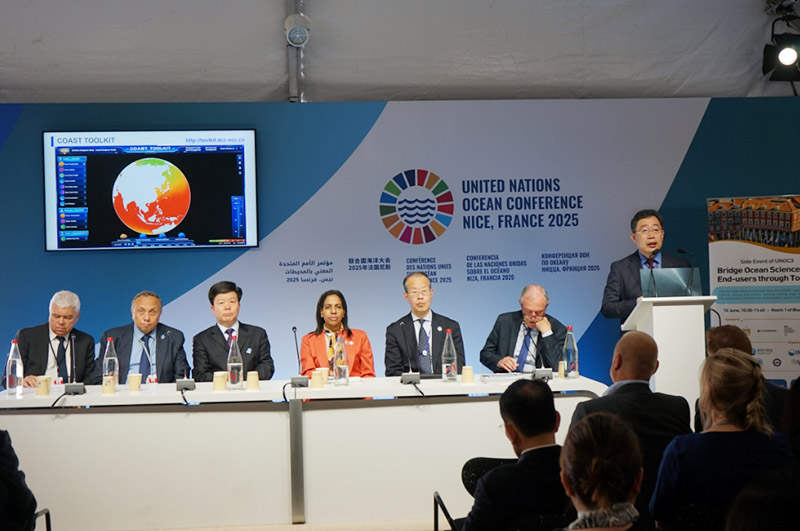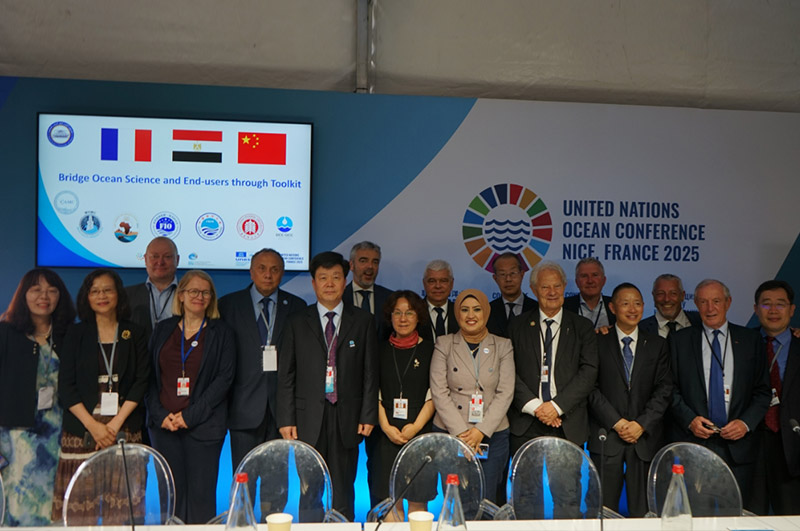From June 9 to 13, 2025, the 3rd United Nations Ocean Conference was held in Nice, France. Based on a series of original scientific and technological achievements, the Ocean-based Solution Toolkit for Sustainable Development in Coastal Cities (COAST Toolkit), developed under the leadership of the research team from the First Institute of Oceanography, was officially released. At the side event "Bridge Ocean Science and End Users through Toolkit," participants engaged in a focused discussion on the COAST Toolkit.
Why was the COAST Toolkit developed?
The ocean plays a vital role in human survival and development, but its sustainable development faces severe challenges. For thousands of years, the ocean’s advantages in navigation and marine resources have fostered the prosperity of coastal cities. However, over 90% of the excess heat from global climate change has been absorbed by the ocean. This, coupled with multiple pressures from human development on the ecological environment and overexploitation of marine resources, as well as increasingly frequent extreme marine events, has seriously impacted the sustainable development of the ocean and humanity.
Addressing these challenges through science has become a global imperative. Effective ocean governance requires broad societal participation, but the complexity and specialization of scientific research make it difficult for the public to use scientific and technological tools to solve problems. While science popularization has enhanced society’s understanding of the ocean, the transformation of scientific knowledge into actionable plans remains a long-term task. Figuratively speaking, ocean science is like fundamental research in optics, whereas the public needs an easy-to-use "camera." The COAST Toolkit acts as this "camera," transforming frontier science into practical solutions.
Why was our research team able to lead the development of the COAST Toolkit?
In 2015, the United Nations proposed the Sustainable Development Goals (SDGs), among which SDG 14 focuses on the ocean. In 2017, the UN General Assembly approved the "UN Decade of Ocean Science for Sustainable Development" (2021–2030), shifting ocean science from pure research to providing scientific solutions for governance.
The development of the COAST Toolkit by our research team is based on three core strengths and foundations:
First, active participation in top-level design and early planning of international platforms. Since the inception of the Ocean Decade, China has been deeply involved. In 2018, 19 leading scientists and administrators were selected globally to form the Ocean Decade Planning Committee (EPG), and Dr. Qiao Fangli from the First Institute of Oceanography, Ministry of Natural Resources, was successfully selected, participating throughout the roadmap and implementation plan design. Leveraging this advantage, China successfully applied to establish the DCC-OCC and led the launch of seven major international science programs including OSF, laying a solid international platform for the toolkit.
Second, original breakthroughs in forecasting theory and innovations in ocean observation technology. Turbulent mixing has long been a global challenge in ocean forecasting. Chinese experts were the first to propose the academic concept of coupled modeling of ocean dynamics systems internationally, and originally developed the "wave-turbulence mixing" theory, improving upper ocean forecast accuracy by about 80% and significantly enhancing typhoon and climate prediction capabilities. Moreover, high observation costs remain a bottleneck issue globally. Through interdisciplinary research, Chinese experts innovatively used the BeiDou Global Navigation Satellite System (GNSS) to develop ultra-cost-effective intelligent new buoys, potentially leading the "fourth revolution" in ocean observation technology.
Third, extensive experience in successful applications and a high-level expert team. The ocean research team, represented by the First Institute of Oceanography, has long combined original theory and technological innovation with service to society. They have played key roles in responding to incidents such as the 2006 Bohai oil spill, the 2008 Yellow Sea green tide, the 2011 Fukushima nuclear wastewater leak, the 2018 East China Sea "Sanchi" oil spill, and the shipwreck rescues in Thailand and Cambodia in 2018 and 2022, accumulating rich experience and forging a high-level, capable, and dedicated team.
Who is the COAST Toolkit for?
The COAST Toolkit provides systematic solutions for the sustainable development of global coastal cities. It aims to help city managers and the public scientifically assess risks and optimize planning and decision-making, thereby enhancing cities’ sustainable development capabilities and coastal resilience.
The toolkit currently consists of six core modules (ocean and climate early warning, maritime safety, nearshore ecological health, integrated coastal management, blue economy support, and ocean literacy enhancement) and 24 submodules, covering key areas of coastal urban sustainability. The toolkit deeply integrates marine big data, advanced numerical models, artificial intelligence technology, and capacity building, offering a comprehensive decision-support tool for end users and decision-makers.
The COAST Toolkit is operated through the “co-design, co-development, and co-benefit” approach advocated by Ocean Decade stakeholders and is open to global users free of charge. Its ultimate goal is to transfer the results of ocean scientific research into knowledge accessible to the public and policymakers, providing a reliable and efficient information and decision-making support platform based on scientific data, thereby promoting science-based decisions for ocean challenges at low cost and supporting the sustainable development of coastal cities.
COAST Toolkit highlighted at the UN Ocean Conference
This year's UN Ocean Conference attracted approximately 15,000 delegates from about 120 countries to discuss global ocean governance. The COAST Toolkit, led by China’s research team, was promoted as a key achievement of the UN Ocean Decade and an innovative solution for global ocean governance, receiving wide attention during the conference.
On June 7, one of the three major special events of the conference—the Summit of the Rising Seas and Coastal Resilience Alliance—was held, with participation from mayors and senior managers of more than 200 coastal cities. The COAST Toolkit was presented as a core outcome to the global audience, and its lead designer, Dr. Qiao Fangli, was specially invited to give a presentation.
On June 10, the side event "Bridge Ocean Science and End Users through Toolkit" was held. Attendees and speakers included Sun Shuxian, Vice Minister of the Ministry of Natural Resources of China; Amr Hamouda, former Chairman of the National Institute of Oceanography and Fisheries of Egypt and Vice Chair of UNESCO’s Intergovernmental Oceanographic Commission (IOC); Francis Vallat, founding chairman of France’s Maritime Cluster and the European Network of Maritime Clusters; Yutaka Michida, Chair of the IOC; and Leticia Carvalho, Secretary-General of the International Seabed Authority. The meeting was co-chaired by former IOC Executive Secretary Vladimir Ryabinin and Suzan M. El-Gharabawy, Vice Chair of the National Institute of Oceanography and Fisheries of Egypt.
In his speech, Vice Minister Sun emphasized that “technological innovation is the ‘golden key’ to solving ocean governance challenges. The COAST Toolkit, through building a platform for dialogue and cooperation, sharing technologies and services, aims to support developing countries in strengthening their capacity for integrated marine management and enhancing the resilience of coastal cities, thereby better protecting and sustainably using the ocean.” Participants highly praised the scientific value and application prospects of the COAST Toolkit, believing its practicality, openness, and adaptability will provide key technical support for global coastal cities, especially those in developing countries, and strongly promote the realization of the UN SDG 14 goals. Representatives from various governments, international organizations, and NGOs held in-depth discussions on the application of the COAST Toolkit, unanimously considering it a vital practice for translating marine scientific achievements into governance. Delegates from developing countries were particularly interested in the localized application of the toolkit and expressed the hope that through international cooperation, its functions can be further optimized to serve the sustainable development needs of vulnerable coastal regions more precisely.
Outlook
The COAST Toolkit is a product of deep engagement by China’s research team in the UN Ocean Decade, contributing to the international community with its comprehensiveness and precision. Its release demonstrates the responsibility and contribution of Chinese scientists in global ocean governance and in building a shared future for the ocean. In the future, the research team will continue to drive innovation, promote open cooperation, continuously optimize the COAST Toolkit, and expand its global application and coverage, contributing wisdom and strength to safeguarding our shared blue planet and achieving global ocean sustainability.

Qiao Fangli, Deputy Director of the First Institute of Oceanography, participated in the side event and introduced the COAST Toolkit

Group photo of the participants